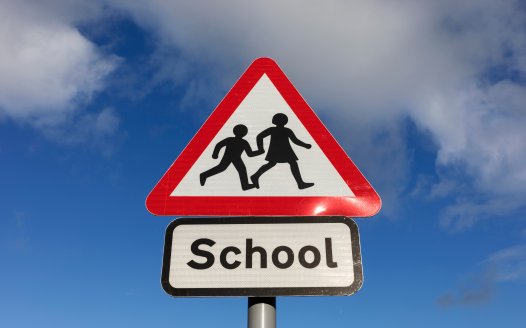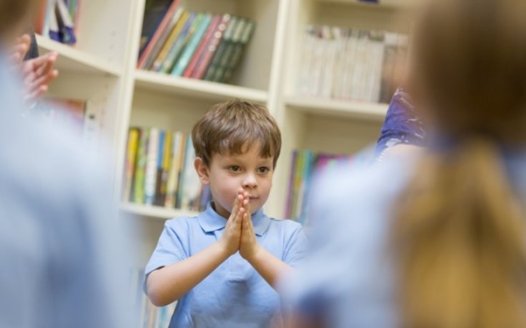My children’s school has become Christian by default
Posted: Fri, 14th Dec 2018 by Lee Harris
Lee Harris didn't choose a faith school for his children. But when he challenged evangelism at his local school, he learnt that community school status doesn't necessarily prevent religion from being imposed on children.
Anyone visiting the Cotswolds would take one look at Burford Primary School and think it is idyllic. Burford itself is a medieval town and that's a big part of its charm. There's a real sense of community between those that have lived here for generations and family's like ours who have been here for under ten years. We genuinely love where we live.
When we put the kids into the local primary school it was the sort of safety and close community you want for your children. We were soon both active contributors to the school. We contributed financially and my wife became pivotal in leading the PTA.
As parents we shared concerns about faith schools, particularly for children so young. We did our homework and chose Burford Primary primarily because it was a non-faith-based community, the only primary school in the town (and one of a minority of non-faith schools within four miles).
Despite having a community school ethos, Burford Primary joined a Christian academy trust when it became an academy in 2015.
In the natural course of asking the kids how their day went, they started telling us about regular assemblies being held by the church in the school. These were led weekly by St. John the Baptist Church. Our children told us they were encouraged to participate in active prayer, Christianity was positioned as truth and Bible stories were 'acted out' including beatings and crucifixion.
Naturally, we raised our concerns. The head explained that she was legally entitled to run daily worship and was simply operating within the law. But this was beside the point. We weren't suggesting the school's conduct was unlawful. We simply noted that schools have wide discretion in their application of the law.
After all, the other four days of the week, this discretion is applied. Assemblies are held and 'Collective Worship' is interpreted as moral stories and reflection time for the children. Yet each Wednesday, St. John's are given a weekly platform to preach to the children.
We raised the fact that the school is not legally obliged to invite the church in to lead assemblies and that this was a choice made by the head teacher which was leading to the exclusion of ours and other children.
This was the first alarm bell indicating that Burford's community school ethos was not necessarily a secular ethos.
Bizarrely the head claimed "we do not have, and never have had, a 'secular ethos'", claiming this "would imply a lack of connection to religious or spiritual matters, which would not be legal".
The only solution offered was to remove our children from the assemblies which we did immediately. We also strongly suggested that the school should tell parents directly the church was offered a weekly opportunity to come in to preach to the children. No communication was offered.
The issues then began to snowball. The school consistently chose to use the church for key events. The church's leaders were offered the opportunity to address the children with their message. Even at the most recent leavers' assembly (which could have been easily held in the school grounds), St. John the Baptist was allowed to host. The children were presented with a Bible as their leaving gift and 'guide in life'.
Our children felt increasingly excluded from assemblies and school activities, left to sit in side rooms for long periods of time with a teaching assistant until we came to pick them up.
More and more it felt like our children were being discriminated against. Daily activities that could help to provide an inclusive environment were seemingly being ignored. Each time the headteacher said she was serving the "majority" of the children and preparing them for life in a "Christian country".
It is remarkably difficult to explain to our children why they are being excluded, when we know that the head teacher has the opportunity to provide inclusive alternatives. As parents, it is heart-breaking to see them separated from their friends and school activities that could be easily avoided.
A few months ago, the straw came that was to break the camel's back. The headteacher had agreed with St John's to invite Warren Furman in to see the children. For those of you that don't know him, he was formerly 'Ace' from the TV show Gladiators but today is a Christian evangelist and self-styled 'Gladiator for the Gospel' who takes the Christian message into primary schools.
The school has since admitted that there was not appropriate due diligence prior to Warren Furman's visit. Policies on external visitors were not followed and no parents were informed. My wife was even working onsite that day and nothing was said to her.
Our children, together with a small group who were normally excused were also told to attend. The school eventually apologised, but for me the whole episode demonstrated spectacular misjudgement. The church's involvement was once again, entirely unnecessary, parents' wishes were ignored and policies designed to protect the children, were side-stepped
At this point, we'd had enough. In our view the headteacher was turning the community school ethos into a faith ethos and ignoring our concerns. So our only option was to take our concerns to the governors.
We asked for three things.
Firstly, for the school to justify its current policy of collective worship, and specifically for assemblies led by the church to stop.
Secondly for key events to be led by a teacher and not a member of the church, allowing all of the children to be included.
Lastly, for the academy to properly maintain a community school ethos, as opposed to a faith-based ethos, and in turn prevent discrimination against children with different or no religious belief.
Our requests were all dismissed.
On collective worship, we asked if the school could not hide behind the collective worship law. Ofsted formally stopped checking compliance 14 years ago and the government say it is for schools to interpret the requirement as they see fit, and many interpret it to mean they should have inclusive assemblies without formal worship. The school's policy is one of choice, which it should own up to and reconsider to ensure no children were unnecessarily excluded.
The answer was no. Even with supporting evidence, the school would not even consider what other options could provide an inclusive environment for the children.
The panel ruled that "acts of worship are not lessons or educational experiences, they are worship and as such it is appropriate that belief is presented as truth".
The reality is that headteachers have an awful lot of latitude to exercise what they think is right, and are able to use the cover of the law to promote religious beliefs which they are sympathetic to.
In the instance of our children, they will miss out on 20% of their school's assemblies because of this decision, together with key events which they should be able to enjoy and benefit from as part of their education.
It is as upsetting for the children as it is unacceptable for parents, when the opportunity to provide an inclusive environment is entirely within the heads control.
A number of parents have now told me they either have removed or are considering removing their children from the assemblies held by the church. The daughter of a close friend who had witnessed domestic abuse left an assembly led by the church in tears after watching a reconstruction of a woman being beaten in a biblical story.
In truth, we need more parents to speak out if we stand any chance of the school taking a more inclusive approach. I lose track of the number of mums and dads who say to me they don't agree with the church's involvement but won't remove them out of fear of their children being excluded. The fact they are forced to make that choice is ridiculous, particularly considering it isn't a faith school.
We have since removed our personal contribution to the school and my wife has stepped down as the head of the PTA, saying she can't knowingly fulfil a role when she feels her kids are being discriminated against. We're now taking our concerns to the Department for Education.
One would hope that those in charge of schools would want to ensure that their environment is inclusive of all children regardless of their religious background. But it seems as if our school leaders have a different agenda.
We love our historically medieval town. It's just a shame that the thinking of those charged with our children's care, still have both feet planted firmly in the past.
This article was amended on 14 December 2018, following communication with representatives of Burford Primary School. The original version had suggested that the school should have a "non-faith ethos". Burford Primary School's representatives have noted that it is a legal requirement for all schools to undertake a daily act of worship, which must be wholly or mainly of a broadly Christian character. We have updated the piece accordingly.

End compulsory worship
No child should be compelled to pray in school. Join our campaign.









